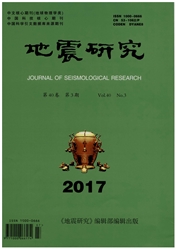

 中文摘要:
中文摘要:
收集2015年宁夏、甘肃和青海地震台网63个三分量地震台站观测到的远震波形数据,使用H-k扫描法研究了区域地壳厚度和平均波速比。地壳厚度分布清晰地展示出自东向西地壳厚度不断增加的趋势,并伴随着2个地壳深度梯度带。研究区域平均地壳厚度为50.8 km,显著高于大陆地壳平均厚度;平均波速比为1.73,对应泊松比为0.25,略低于大陆平均泊松比(0.265)。分析认为研究区域中东部地壳增厚主要发生在上地壳,长英质岩石含量增加使整体泊松比下降。某些区域表现出超高的泊松比,推测这些区域可能存在岩石部分熔融现象。古浪大地震、海原大地震和这次门源地震都发生在泊松比梯度带和地壳厚度梯度带泊松比较低的一侧。
 英文摘要:
英文摘要:
Using the collected earthquake waveform data of Menyuan MS6.4 earthquake recorded by 63 3-compoents earthquake stations in regional seismic network in 2015,we calculated regional crustal thickness and velocity ratio by H — k scan method.The distribution of crustal thickness clearly showed a increasing trend from east to west with two remarkable crustal thickness gradient band zone.The average crustal thickness is 50.8 km,which is significantly thicker than average thickness of continental crust and the average Poisson's ratio is 0.25,which is a little lower than continental average value 0.265.We analyzed the studying results and found that the crust thickening in the middle east of the study area mainly occurred in the upper crust,the increase of the content of the felsic rock resulting in the low Poisson's ratio.The super high Poisson's ratio appears in some areas,we deduce that there exit the partial melting.The Gulang earthquake,Haiyuan earthquake and Menyuan earthquake all occurred near the gradient zones of Poisson's ratio and crustal thickness,and the side of low Poisson's ratio.
 同期刊论文项目
同期刊论文项目
 同项目期刊论文
同项目期刊论文
 期刊信息
期刊信息
